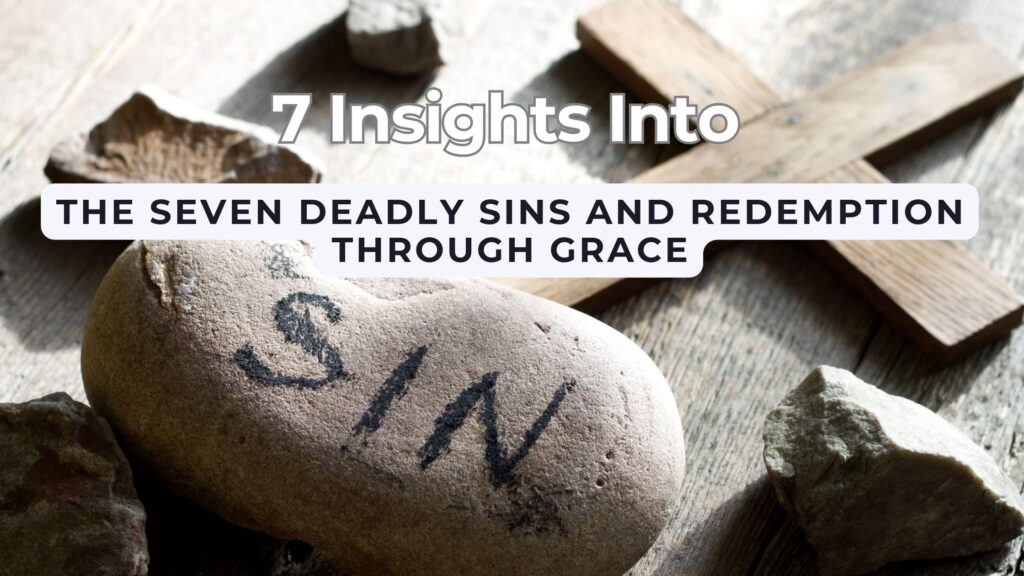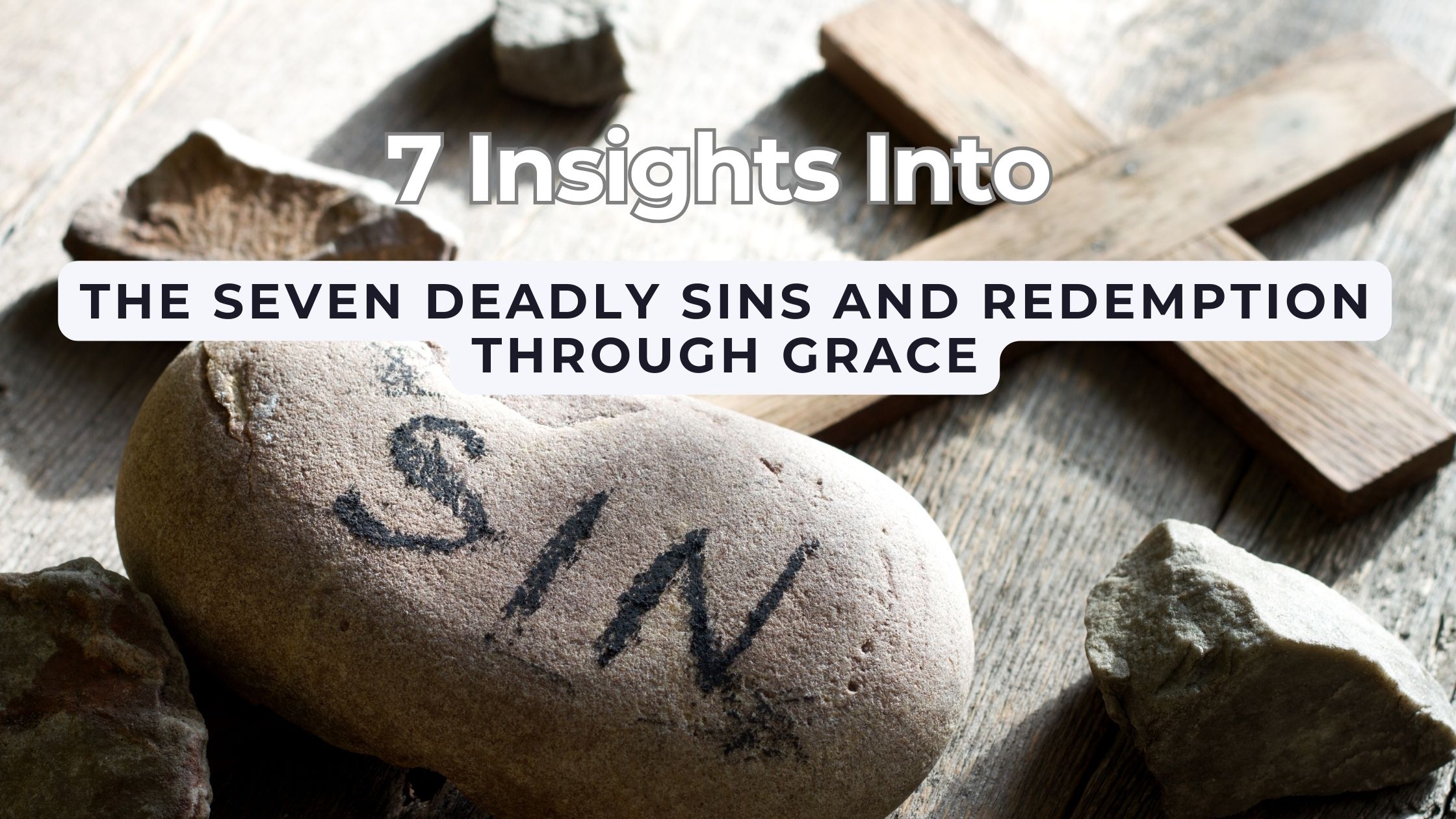The idea of the seven deadly sins — pride, greed, lust, envy, gluttony, wrath, and sloth — has been a foundation of Christian moral philosophy for quite a long time. These sins are individual demonstrations of bad behavior as well as are perceived as well established indecencies that can ruin the spirit and disturb our relationship with God and others. Nonetheless, close by the affirmation of human delicacy comes the commitment of recovery through grace. This double spotlight on human wickedness and heavenly leniency gives significant bits of knowledge into both the human condition and God’s extraordinary power.

The Idea of Pride and Its Remedy from Seven Deadly Sins
Pride is much of the time thought about the base of all transgression, as it lifts the self above God and others. This inordinate self-respect blinds us to our reliance on God and twists our connections. Pride appears in unobtrusive structures, for example, a reluctance to concede botches or a fixation on private accomplishments.
The cure to pride lies in lowliness, which perceives our actual spot according to God. Modesty isn’t humility yet a legit affirmation of our limits and dependence on divine grace. By developing lowliness, we open ourselves to God’s changing power, permitting us to live genuinely and as one with others.
Greed and the Call to Liberality of Seven Deadly Sins
Greed, or eagerness, comes from an unquenchable longing for material belongings or riches. It energizes discontent, making us center around what we need as opposed to what we have. Greed can prompt abuse and mischief, as it focuses on belongings over individuals.
Liberality fills in as the solution for greed. By sharing what we have with others, we break liberated from the grasp of realism and develop a feeling of appreciation. Liberality mirrors the personality of God, who gives plentifully and calls us to be stewards of His favors. In rehearsing liberality, we favor others as well as experience opportunity and satisfaction.
Lust and the Quest for Immaculateness of Seven Deadly Sins
Lust diminishes people to objects for individual delight, twisting the holiness of human connections and sexuality. It flourishes in a culture that frequently focuses on prompt joy over getting through adoration and regard.
Immaculateness is the excellence that counters lust. It includes celibacy in actual activities as well as the development of a heart situated toward affection and regard for other people. Virtue doesn’t mean restraint yet a legitimate requesting of wants as indicated by God’s plan. Through grace, we can conquer the draw of lust and embrace connections that mirror God’s affection and devotion.
Envy and the Delight of Satisfaction from Seven Deadly Sins
Envy emerges from contrasting ourselves with others and feeling disdain over their triumphs or endowments. It upsets our capacity to praise the positive qualities in others and toxins our associations with harshness and disappointment.
Happiness is the counteractant to envy. By rehearsing appreciation for our own favors, we shift our concentration from correlation with appreciation. Happiness develops when we confide in God’s arrangement and perceive that our not entirely set in stone by our status or assets yet by our way of life as His youngsters. In embracing happiness, we discover a sense of harmony and delight in the special excursion God has set before us.
Gluttony and the Discipline of Restraint from Seven Deadly Sins
Gluttony is an unreasonable extravagance in food, drink, or different types of utilization. It mirrors a more profound otherworldly void that looks for satisfaction in actual joys as opposed to in God. Gluttony can hurt our actual wellbeing, misshape our needs, and distance us from our otherworldly reason.
Balance, or poise, is the goodness that goes against gluttony. It includes control and a careful way to deal with utilization, recognizing that genuine fulfillment comes from God alone. By rehearsing moderation, we honor our bodies as sanctuaries of the Essence of God and figure out how to live in equilibrium and discipline.
Wrath and the Power of Absolution from Seven Deadly Sins
Wrath, or uncontrolled indignation, annihilates connections and breeds patterns of retribution and disdain. While outrage itself isn’t intrinsically evil, wrath becomes damaging when it prompts mischief or when it consumes us with disdain.
Absolution is the solution for wrath. It breaks the chains of outrage and makes the way for compromise. Absolution doesn’t mean overlooking bad behavior however deciding to deliver the weight of outrage and share equity with God. Through absolution, we mirror God’s leniency and make ready for recuperating and harmony.
Sloth and the Call to Intentional Living from Seven Deadly Sins
Sloth, frequently misconstrued as simple lethargy, includes a more profound otherworldly lack of care or detachment to God’s call. It prompts a day to day existence without reason, disregarding both self-improvement and the requirements of others.
Industriousness, or intentional living, counters sloth. It includes embracing our inherent obligations and chasing after our work with energy and responsibility. Through constancy, we honor God’s arrangement for our lives and track down satisfaction in significant work and administration.
Recovery Through Grace from Seven Deadly Sins
While the seven deadly sins feature the manners by which we miss the mark, the story doesn’t end there. God’s grace offers recovery and recharging, empowering us to beat these indecencies and fill in ideals. Grace isn’t procured yet openly given, a demonstration of God’s unlimited love for humankind.
Through confidence, atonement, and the extraordinary work of the Essence of God, we can break liberated from the chains of wrongdoing. Ceremonies, for example, admission and the Eucharist furnish unmistakable experiences with God’s grace, reinforcing us in our profound excursion. Sacred writing and petitioning heaven likewise assume a crucial part in assisting us with perceiving our requirement for God and adjust our lives to His will.
The Job of Local area in Beating Seven Deadly Sins
Beating the seven deadly sins is definitely not a singular undertaking. Christian people group offers help, responsibility, and consolation as we make progress toward sacredness. Cooperation with different adherents advises us that we are in good company in our battles and that we can draw strength from each other.
Local area additionally mirrors God’s grace, as we experience His adoration through the generosity and backing of others. By living in genuine connections, we fill in ideals and become observers of God’s changing power.
End: Seven Deadly Sins
The seven deadly sins offer a sobering reflection on human shortcoming, yet they likewise highlight the vast conceivable outcomes of reclamation through grace. Pride, greed, lust, envy, gluttony, wrath, and sloth might take steps to eclipse our lives, yet they are no counterpart for the groundbreaking power of God’s adoration.
By embracing lowliness, liberality, virtue, happiness, moderation, pardoning, and constancy, we fall in line with God’s will and mirror His picture in our lives. Through grace, we are pardoned as well as empowered to live highmindedly, taking the stand concerning the expectation and recharging tracked down in Christ. The excursion might be testing, however with God’s grace and the help of an unwavering local area, we can conquer the seven deadly sins and experience the completion of life that God longings for us.


